Growing Remote Work Culture
The shift towards remote work is reshaping the mobile voip market landscape. As more organizations adopt flexible work arrangements, the need for reliable communication tools has intensified. Mobile voip services provide an effective solution for remote teams, enabling seamless communication regardless of location. Data suggests that approximately 30% of the US workforce is now engaged in remote work, driving demand for mobile voip applications that facilitate collaboration. The mobile voip market is thus likely to see sustained growth as businesses continue to prioritize communication solutions that support remote work dynamics.
Advancements in Mobile Technology
Technological advancements in mobile devices and networks are significantly influencing the mobile voip market. The proliferation of smartphones equipped with high-speed internet capabilities has made it easier for users to access mobile voip applications. Furthermore, the rollout of 5G technology is expected to enhance the quality and reliability of mobile voip services, potentially increasing user adoption rates. As mobile devices become more sophisticated, the mobile voip market is likely to benefit from improved user experiences, leading to higher engagement and usage rates. This technological evolution may also encourage new entrants to the market, fostering competition and innovation.
Increased Focus on User Experience
User experience has become a critical factor in the mobile voip market. As competition intensifies, service providers are placing greater emphasis on delivering intuitive and user-friendly applications. Features such as high-definition voice quality, easy navigation, and integration with other communication tools are becoming essential for attracting and retaining users. The mobile voip market is responding to this demand by investing in research and development to enhance service offerings. This focus on user experience may lead to increased customer satisfaction and loyalty, ultimately driving market growth.
Regulatory Support for VoIP Services
Regulatory frameworks in the US are evolving to support the growth of the mobile voip market. Government initiatives aimed at promoting digital communication technologies are creating a favorable environment for mobile voip service providers. Policies that encourage competition and innovation in the telecommunications sector are likely to benefit the mobile voip market. Additionally, regulatory clarity regarding the use of VoIP services can enhance consumer confidence, further driving adoption. As these supportive measures continue to unfold, the mobile voip market may experience accelerated growth and expansion.
Rising Demand for Cost-Effective Communication
The mobile voip market is experiencing a notable surge in demand for cost-effective communication solutions. As consumers and businesses alike seek to reduce their communication expenses, mobile voip services offer a compelling alternative to traditional telephony. Reports indicate that mobile voip can reduce communication costs by up to 50%, making it an attractive option for budget-conscious users. This trend is particularly pronounced among small and medium-sized enterprises (SMEs) in the US, which are increasingly adopting mobile voip solutions to streamline operations and enhance connectivity. The mobile voip market is thus poised for growth as more users recognize the financial benefits associated with these services.

















